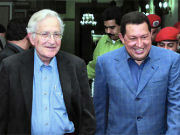FE Note: The comrades of Venezuela’s El Libertario magazine are unrelenting in their criticism of what they call the myth of Hugo Chavez’s “Eco-socialism of the XXI Century.”
They often write about the general unwillingness to see the authoritarian side of Chavez as an echo of how almost the entire Left, including many anarchists, refused to criticize the Cuban revolution.
A longer version of this appeared in El Libertario, #51, available on-line at
http://nodo50.org/ellibertario in their English section.

The famous writer Noam Chomsky has proved that intelligent and cultivated intellectuals are also capable of believing and adopting conduct and political action totally dogmatic, false and authoritarian.
It is nothing new to see a highly-ranked intellectual falling into such contradiction. In the Soviet Union and Maoist China, we saw the irrational phenomenon of the “fellow travelers. Those intellectuals who believed–many of them in good faith–in the establishment of “socialism” and the construction of “the new man” in those countries until the facts forced them to realize what those regimes really were.
In Chomsky’s case, it is not possible to forget that he himself fought against this tendency in the past. That is why it is imperative to ask: how can a man, apparently capable of reasoning, of critical analysis of what happens in the world, travel to Venezuela today to sing the praises of “XXI Century socialism” without noticing the military mentality of its inventor, Commander Chavez, nor the crass populism of his so-called Bolivarian Revolution?
How can Chomsky commit the same error as some famous intellectuals of the past century, some praising Stalin and some, years later, revering Mao and his Little Red Book? They did so because they believed that in Russia and in China they were building “true communism,’ and Chomsky does so now because he believes that in Venezuela “a new world, a different world” is being created.
How CAN HE FORGET THAT later all those intellectuals were forced to confess a “mea culpa” for their ideological blindness that prevented them from seeing what was behind the Stalinist and Maoist revolutionary discourse? That totalitarianism, responsible for the death of millions of people, inspired Castro to impose for fifty years a dictatorship in Cuba that Chavez devoutly imitates.
But what is surprising in the Chomsky of the last few years is not only his apparent historical amnesia, but that he is receptive to the praise the histrionic Commander bestows on him, saying: “I give you the warmest welcome. It was time for you to visit us and for the Venezuelan people to see you and hear you directly,” while the famed linguist shows his gratitude for these “loving and generous words.”
What is most surprising about Chomsky’s conversion to a messianic faith is that the [Venezuelan] “miracle” occurs after the collapse of “real socialism” of Soviet inspiration and the establishment of capitalism in China by the same communist party Mao left in power.
IN CONTRAST TO the young intellectual idealists who worshipped Stalin or Mao, Chomsky has been able to observe them in his lifetime and that makes more incomprehensible the fact that he now seems to have forgotten. Above all, the failures of messianic revolutions confirm without a doubt all his earlier prophecies.
This happened despite the fact that Chomsky’s ethical position, his ideological references, and his political activity are contrary to what many of his followers defend and value, This is easy to see simply by reading his books, unless today’s Chomsky is not the same who wrote: “We are in a time of corporatizing power, consolidating and centralizing power. Three important things come from the same background: fascism, bolshevism, and corporate tyranny. They all come from the same more or less Hegelian roots.” (Chomsky, Class Warfare)
Could it be the fact that in Chomsky’s view the most important thing is to denounce the injustices prevalent in the USA as well as the injustices generated by this country on a global scale, drives him to stake his position on what happens in the American continent in such a confusing manner?
Although Chomsky still considers himself “anarchist-libertarian,” it’s clear that for him ideological considerations must be relegated to the background and a kind of gradation must be made between injustices according to the degree of global danger posed by the targets of his criticism.
The problem is that such political relativism allows many Marxist-Leninists, demagogues and politicians, whose only concern is the conquest of power, its execution and conservation, to get shelter in Chomsky’s anti-imperialist arguments instead of caring about helping the people to organize themselves.
On the contrary, maintaining such immoral discretion with such perseverance and allowing himself to be photographed besides the Castros and the Chavezes, he becomes an accomplice of the authoritarian, dictatorial deviations of these modern day oligarchs.
Unfortunately, this obstinacy in maintaining such Manichean discretion (considering that these demagogues access to power is less of a danger than the destruction caused by Yankee imperialism in the world) is not only inefficient in preventing such destruction (these demagogues continue to do business with the empire’s multinational corporations), but also contributes to demobilize people and makes even harder the task of those who struggle against worldwide domination by Capital and the State.
About the author: In 1955, Octavio Alberola organized in Mexico in solidarity with the Cuban struggle against the Batista dictatorship; later, directly supporting preparations for Castro’s landing on the island.
In 1962, in France, he coordinated Interior Defense, comprised of Spanish anarchists in exile, the CNT, the FAI, and the Iberian Federation of Libertarian Youth, to re-activate the struggle against Franco’s dictatorship. They carried out sabotage, attempts on Franco’s life, printed clandestine propaganda, and helped people fleeing Spanish fascism.
Today, he works with the Support Group for Independent Libertarians and Syndicalists in Cuba (GALSIC), among other activities. He is the author of El anarquismo español y la acción revolucionaria (1961-1974) and Miedo a la memoria.
